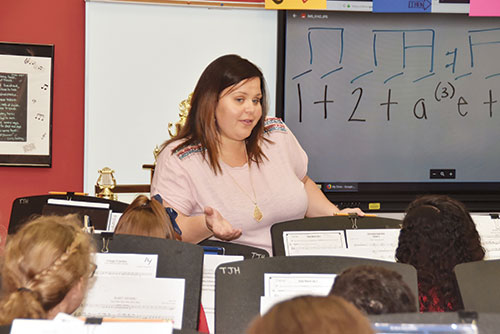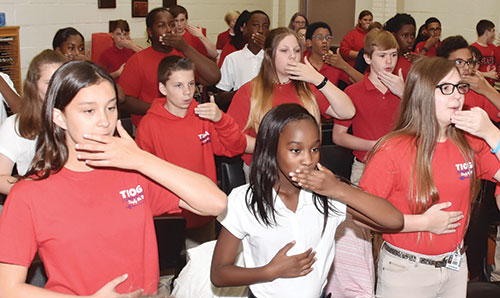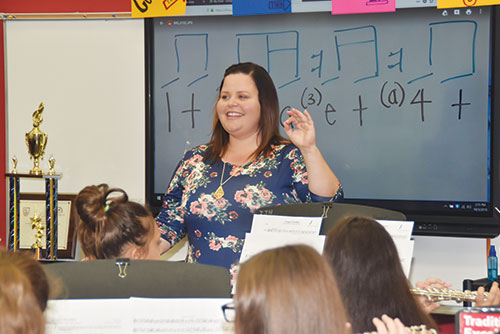Jessica Fain is in her tenth year as the band director at Tioga Junior High School in Ball, Louisiana where she teachers seventh and eighth grade band students. The 2018 Bandmaster of the Year for the Louisiana Bandmasters Association, Fain is an expert on motivation and has also set up a team teaching program with high school director Ty Lege. At the high school, Fain’s primary role is as percussion instructor, and she also assists with after-school marching band rehearsals, football games, and competitions. She has been mentoring student teachers since her third year of teaching and notes that what new teachers need to be reminded of most often is “It’s going to be okay. It will be okay, and every day is a new day. This is especially something junior high teachers need to hear. We all make mistakes, but junior high students forget such things quickly. Tomorrow is a new day with chances to be better.”
My high school band director used to tell me, “The scary thing about you is you could lead a group of people to do something and you don’t even realize you can do it.” I didn’t believe this until I became an educator. I am a high-spirited, high-energy person, which most junior high kids relate to. Even on days when I come to school exhausted, I tell myself, “Jess, you have to turn it on.” If you are exhausted, students will react to that. I want them to have the same high energy level I do, even at 7:15 a.m.
You have to be able to read the students. I am a high-energy teacher, but there are some classes that do not respond to that, and I have to take a more subdued approach to avoid intimidating quieter students. You also cannot mimic someone else’s personality in the classroom. You have to go in and do what works for you.
Getting to know your students is also important. Although I start every rehearsal by saying good morning to the students, on Monday, this time is expanded, and I ask students to share something cool about their weekends. As the year progresses, students begin to share more or join in for the first time. If I forget Monday Musings, students are quick to remind me.
It is essential to find time for fun. For our football games, I teach students fun chants and do the chants with them. This develops spirit and pride for the organization. We also have an annual Halloween concert that is standing room only, and for our Christmas parade, sections decorate their instruments and themselves to see who can have the best decorated section.

What are the best ways get junior high students excited about the music program?
Give students a sense of ownership over what they are doing. I see the buy-in happen when students feel like they have a say in the program. This can be as little as choosing their morning sectional time. My eighth graders take on leadership roles, including running before-school sectionals. These are not mandatory; students can choose whether to attend, and almost every student comes at some point. Junior high students are a lot more intimidated of their teachers than they are of their peers. The morning sectionals have helped students bond with each other. This is also important. Children want to feel connected to something.
At my school we have an activity elective class scheduled at the end of the day. Students can choose from a wide number of options, including P90X and basket weaving. All of my eighth graders chose to be with me, and I split this time between chamber music and leadership training. I teach that the most important part of being a leader is to be a servant, not a dictator. I use myself as an example. As a band director, I am serving the program by helping guide them on the path to success. Likewise, when eighth graders run sectionals, they are not there to tell younger students what to do, they are there to guide them on their path to become a better musician. It pays dividends when I hear them quote me during sectionals. I am pretty nitpicky, and they emulate that when they say something like, “No, you have to play all the way to the end of that note.” Teachers don’t realize how much adolescents pay attention.
Another key to getting students invested is to teach them the rewards that come from hard work. I think students at this age level are often rewarded too much, but I want them to know that in band hard work pays off, and I want to motivate them to have an internal drive to improve. Teaching at a school with only two grades means I have a high rate of turnover. When seventh graders arrive, the aim is to develop that internal drive. Once they have it, they are invested in the band because they have pride in the program.
One example of how I teach this is in testing. I warn students that is difficult to earn a 100 on one of my playing tests, and I stick to this. I believe that if you tell students it will be difficult to earn a 100, you have to maintain exacting standards. If it becomes easy to get a 100, then I am just accepting mediocrity. I don’t want students to be mediocre.
Students receive a copy of my assessment rubric before they take a test, so they know how they will be assessed. Some non-negotiables are always part of the assessment. These include good posture, supporting their sound with air, and correct articulations – all the common things we expect of student musicians. Other elements relevant to each test are also added. Each part of the rubric is ranked on a five-point scale. For students to earn a perfect score, everything on the rubric must be done to the highest level.
It is rare for any student to earn a 100% on a playing test, but those who do get into the 100 Club. Their names are announced over the intercom at school, and I put that student’s name on a star on the window in my office. The star stays up for a week, and then students get to take it down and keep it.
What are some of your other motivational tools?
When I first saw the band room at Tioga Junior High School, I noticed a plaque labeled “60 Second Scale Challenge” that had no names engraved on it. From talking with past band directors, I discovered that the goal was for students to play all twelve major scales plus a Bb chromatic in 60 seconds or less. I started encouraging my students that they could work up to this by telling them how great it would feel to know your name will be on a wall years after you have graduated. Eighth graders are required to know all twelve major scales anyway.
At the end of the year, I give students a window during which they could pass off the challenge. One particularly competitive eighth grade class had 18 people get their names on the plaque. Although I only require seventh graders to learn seven major scales, I had one seventh grader work ahead and pass the challenge. I have three filled plaques now. It has been a huge success, and I find most of the students who can pass the challenge end up as first chair in high school and are more likely to make the All-State Band.
Another student reward is the golden stand, an idea I took from a band directors page on Facebook. I spray painted two music stands gold, and when a student plays well on an assessment, improves drastically, or does something above and beyond for me, such as clean the room or set everything up, that student is awarded the golden stand for a week. At first I didn’t think it would be a big deal, but I started seeing students work had for it. Every week, someone asks when I am going to announce golden stands for the next week.
I like using Kagan strategies because they give students an opportunity to teach and praise one another. One good example is called shoulder partners, for which I say, “Turn to your shoulder neighbor and ask what the name of that note and the fingering are, and when you’re done high five them and tell them ‘great job.’” This works for many things, and not just when students are seated. When we stand for breathing exercises, I have students find a partner in a different section.
When a student does something well in my classroom, I’ll say, “Two claps for success.” Not only am I having students praise a peer, but they also have to do it rhythmically. I say, “Ready, and,” and students have to give the two claps in the tempo I give them. Students receive praise and get extra practice counting in time instead of waiting for me to give feedback to everyone.
I hand out free test tickets to students who do something extra for me. At the end of each rehearsal I tell students to push down their stands and push them up against the chair in front of them. If a student picks up trash off the floor or takes some of the pencils I keep clipped to each stand to be sharpened, I might slip them a free test ticket. I also do this if I catch them being good citizens outside the classroom. Students can use a free test ticket for anything but a chair test. They still have to play the exam so I can hear and assess them, but they get an automatic 100. Interestingly, few students ever turn them in. They have pride about knowing how they did.
I give out an occasional Most Outstanding Section award. The qualifiers and timing vary. I recently honored a section in which every member has attended sectionals five days a week since the third week of school. They come in voluntarily every morning and get to work, so they were recognized for exceeding even my expectations. I have also calculated everyone’s grade mid-quarter and given it to the section with the highest average grade. The award can even go to a section that has improved the most over a period of time. I try to award it weekly, but sometimes the award is only given every two or three weeks.
Every nine weeks our school holds a pep rally to celebrate students’ academic successes. I make sure band students are recognized during these, and will take advantage of these opportunities to announce students in the 100 Club, winners of the golden stand, and outstanding section awards.

What do non-percussionists need to know about percussion?
Some people believe that a percussionist should be stronger on either battery or melodic percussion, but I believe a good percussionist is a well-rounded one. Thus, I put heavy emphasis on both battery and melodic instruments.
I am fortunate to have a percussion class separate from the rest of the band. While seventh graders work on mallet percussion, eighth graders practice battery percussion. We switch halfway through class. I pop into both rooms, but I spend most of my time with my seventh graders. On battery percussion, students need to learn the basic rudiments required for honor band auditions, as well as techniques relevant to the music they’re going to be performing in my ensembles. The same goes for mallets. Students should know their scales and play with proper technique. When I teach at the high school, I build on what I taught them at the junior high, with the goal of developing the to the point at which they would be comfortable playing at the collegiate level if they choose to.
The other key is to treat percussionists the same as the wind players. They should have the exact same standards for everything, including breathing. I teach my percussionists that when the band breathes, they should breathe. Breath is a preparation for everyone to enter together.
If the band is playing a warmup exercise, directors might leave percussionists out entirely or give them the flute part, which is frequently of little benefit. Percussionists should be given something applicable to their instrument. While the band is playing a warmup, have the percussionists on practice pads or a mallet instrument playing different sticking exercises. This is something applicable that will benefit them long term. Percussionists get left alone in the back of the room a lot, but you want them to feel like a part of the band and be occupied at all times, which eliminates behavior problems back there.
Seek out composers who write well for percussion. Randall Standridge is one of my favorites. He is a percussionist, and he taught my cousin back in high school. David Shaffer and Michael Sweeney are also favorites. They write good percussion parts in their music. We are working on Sweeney’s Ancient Voices this fall.
I also put a heavy emphasis on percussion ensemble. The percussion ensemble literature out there now is perfect for giving students an opportunity to work on things that hone in on their skills. I combine my junior high and high school percussionists for a percussion ensemble concert. Each group performs separately, and then the junior high and high school students combine to play something together.
How do you build community support for the program?
What I learned is that you have to establish yourself in the community. The community has always supported the band program, but once people knew that I was in it for the students, I started to see a big turnaround. Traveling around the community helps. We perform at all the elementary schools every year at Christmas and at the end of the school year. In addition, any time I was asked to play at a local event, I said yes. We have performed at Walmart, local nursing homes, and Mardi Gras. That willingness to perform at community events has contributed to the large attendance at concerts.
Although the primary purpose is community involvement and service, the willingness to bring students to perform has also boosted the program at the beginning level. When I go to the elementary schools, students tell me they can’t wait to be in band. When they get to junior high and I ask what made them want to be in band, many students mention these elementary school concerts.

Describe a typical rehearsal.
Every day the daily agenda is posted on the board, so students know when they walk in what to expect and what materials they need. I have students use black binders, sheet protectors, and pencil pouches, and they have to take everything out of their binders and have it on their stand ready to go. The schedule on the board is not just an agenda, it is also a time stamp. When I mark that we are going to spend five minutes working on something, that’s how long we spend on it. It is important to keep the pacing of the rehearsal moving. I try to keep the kids playing as much as possible. When we aren’t playing, I am motivating them with praise and constructive criticism. Keep them playing and pump them up.
After I greet them and say good morning. I have students stand up and we start with breathing exercises. From there, we move to rhythm exercises. Every day we run a few lines from Teaching Rhythm Logically by Darcy Williams. We then work on technique building, which might be from a method book or from supplemental materials I find or write. We sightread three times a week.
Then, depending on what we are working on, we play different pieces of music at all different levels. I will ask for groups of instruments to play and try to put them in trios or quartets, so they can hear each person playing. Rehearsing band music in a smaller group develops independence and gives other students a chance to praise, critique, and teach their peers.
At the end of class I say, “Love you, mean it.” I got that from my percussion teacher. He did that every single day, and I didn’t realize how much that meant to me until I started doing it for my students and saw how much it meant to them. If I forget, they say it first.
Dan Blaufuss is managing editor of The Instrumentalist. He earned degrees in music education and media communication from Northern Illinois University.





